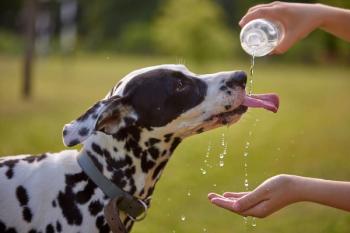
Southern Minnesota sees new PRV outbreak; risks of spread low
St. Paul-A recent pseudorabies outbreak in southwestern Minnesota puts swine producers in southern Minnesota and northern Iowa back on alert for PRV in their herds. The outbreak also reinforces the importance of PRV vaccination in breeding herds and finishing units, experts say.
St. Paul-A recent pseudorabies outbreak in southwestern Minnesota puts swine producers in southern Minnesota and northern Iowa back on alert for PRV in their herds. The outbreak also reinforces the importance of PRV vaccination in breeding herds and finishing units, experts say.
A recent outbreak of PRV in southern Minnesota put veterinarians and producers on alert for pseudorabies. Veterinarians are also calling on producers to vaccinate their sow herds.
Ten Minnesota counties along the Iowa border have recently been upgraded to Stage IV pseudorabies virus eradication joining the rest of the state in that designation.
"Despite this isolated outbreak, the risk of PRV infection in southern Minnesota is currently very low," says Dr. Paul Anderson, swine division director of the Minnesota Board of Animal Health. Vaccination of breeding herds in Minnesota is now at the discretion of the veterinarian and producer.
Area practitioners agree
"We certainly continue to urge our swine producers to continue vaccinating their sow herds at this time," notes Dr. Tim Klein, one of six veterinarians at South Central Veterinary Associates in Wells, Minn.
"Our plans are to continue this recommendation through the summer at least, in order to give us additional time to see if Iowa continues to show the good progress evident last year," he adds.
Klein says that vaccination recommendations for finishing pigs will be based on degree of risk in each geographic area as fall approaches. With Minnesota in Stage IV, a positive PRV test would result in a recommendation to vaccinate nearby finishers.
Minnesota continues to support PRV vaccination through reimbursement programs.
Currently federal and state classification of pseudorabies in Stages I - V is based on slaughter checks, on-farm testing and confirmation of pseudorabies outbreaks.
Several states have used the following guidelines for PRV classification.
- Stage I involves the preparation and implementation of a PRV program.
- Stage II handles surveillance, control and clean-up of known infected herds.
- Stage III has less than 1 percent infected herds.
- Stage IV has no known PRV infection and no new cases confirmed within one year of application.
- Herds in Stage V have been free of PRV for one year since recognition of Stage IV.
Because vaccination policy is not directly linked to the pseudorabies stage designation, each state is free to make its own vaccination requirements.
Dr. Brian Roggow, one of eight swine veterinarians in the Fairmont Veterinary Clinic, located in Fairmont, Minn., is encouraging his clients to vaccinate sows and finishers for PRV through the summer.
"The majority of our clients have no intention of discontinuing vaccination for PRV in their sow herds but the finishers are another issue," says Roggow. "Vaccination in the finishing barn is a labor and manpower issue for most producers."
Unfortunately, stopping vaccination in the finishing barn - an option some producers consider to reduce labor and cost that can provide an opening for PRV.
"If PRV gets in the finishing barns and a pseudorabies outbreak occurs, it can create a large enough cloud of PRV to break through into the sow herd," stresses Roggow. "And that can take down a sow herd and lead to quarantining the entire operation."
Vaccination is an important insurance program against big potential losses from PRV, reports Dr. Rick Sibbel, a veterinarian with Schering-Plough Animal Health.
According to Sibbel, it is generally recognized by state veterinarians that vaccinating sows for 15 months past the last appearance of PRV in the county is good policy.
Klein stresses that veterinarians and swine producers must remain vigilant as the state moves into Stages IV and V. "We need to be prepared to move quickly and vaccinate animals if we have a flare-up in localized areas," he says.
One area of concern remains in the pseudorabies-positive feral pig population. "I think veterinarians and swine producers need to be aware that feral pigs continue to pose a PRV risk and their populations and proximity to domestic pigs need to be monitored," Sibbel adds.
"Veterinarians and producers need to keep appraised of the pseudorabies situation in their area even as we work toward PRV-free status in the United States," says Sibbel. "It will be two to three years without a case of pseudorabies before there is a real lack of risk from the disease to swine herds."
Newsletter
From exam room tips to practice management insights, get trusted veterinary news delivered straight to your inbox—subscribe to dvm360.






